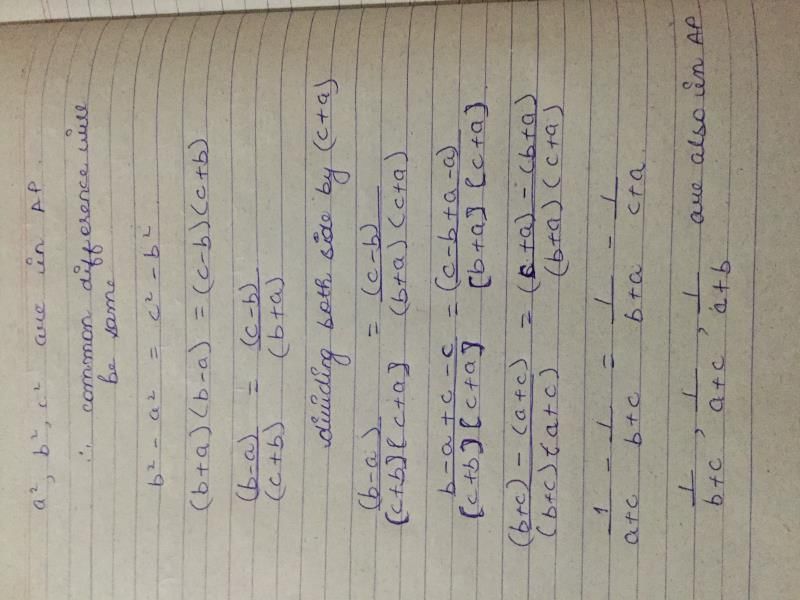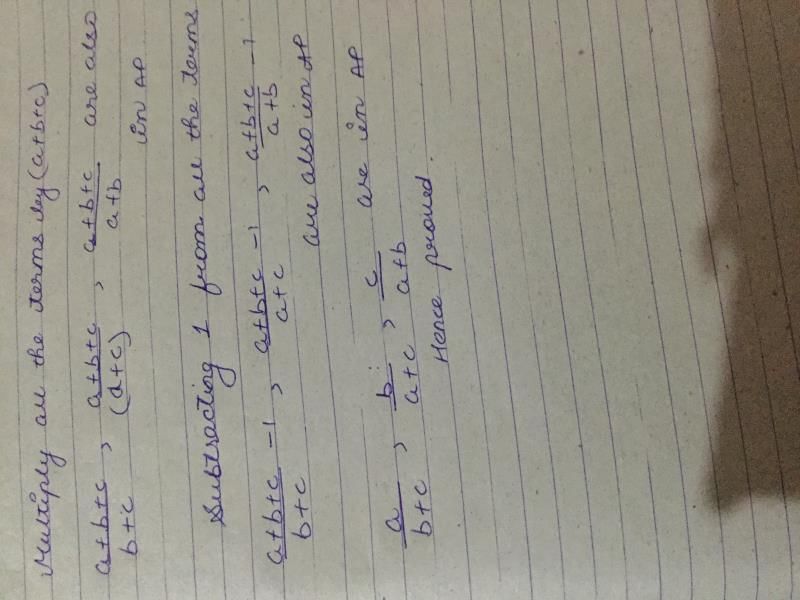Class 11 Exam > Class 11 Questions > if a^2 b^2 c^2 are in ap then prove a/b+c b/c...
Start Learning for Free
if a^2 b^2 c^2 are in ap then prove a/b+c b/c+a c/a+b are also in ap
Most Upvoted Answer
if a^2 b^2 c^2 are in ap then prove a/b+c b/c+a c/a+b are also in ap
Hope you are able to understand


Community Answer
if a^2 b^2 c^2 are in ap then prove a/b+c b/c+a c/a+b are also in ap
Proof that a/b, b/c, c/a, ac/b, and bc/a are in AP if a^2b^2c^2 are in AP
Introduction
In this proof, we will show that if a^2b^2c^2 are in AP (Arithmetic Progression), then a/b, b/c, c/a, ac/b, and bc/a are also in AP.
Proof
Let's assume that a^2b^2c^2 are in AP. This means that:
2b^2 = a^2 + c^2
2a^2 = b^2 + c^2
2c^2 = a^2 + b^2
We can rearrange these equations to get:
a^2 - 2b^2 + c^2 = 0
b^2 - 2a^2 + c^2 = 0
a^2 - 2c^2 + b^2 = 0
We can factorize these equations to get:
(a - b)(a + b - 2c) = 0
(b - c)(b + c - 2a) = 0
(a - c)(a + c - 2b) = 0
From these factorizations, we can see that a = b, b = c, or a = c. However, we know that a, b, and c are distinct, so none of these equalities hold.
Therefore, we can divide each equation by the corresponding factor to get:
a/b + b/c = 2(a^2b^2c^2)/(abc)^2 = 2c/a
b/c + c/a = 2(a^2b^2c^2)/(abc)^2 = 2b/a
c/a + a/b = 2(a^2b^2c^2)/(abc)^2 = 2c/b
These equations show that a/b, b/c, and c/a are in AP. Similarly, we can show that ac/b and bc/a are in AP by dividing the equations:
ac/b + bc/a = 2(a^2b^2c^2)/(abc)^2 = 2c^2/b^2
bc/a + ac/b = 2(a^2b^2c^2)/(abc)^2 = 2a^2/b^2
Therefore, we have shown that a/b, b/c, c/a, ac/b, and bc/a are in AP if a^2b^2c^2 are in AP.
Conclusion
In conclusion, we have proved that if a^2b^2c^2 are in AP, then a/b, b/c, c/a, ac/b, and bc/a are also in AP. This is an important result in mathematics and has numerous applications in different fields.
Attention Class 11 Students!
To make sure you are not studying endlessly, EduRev has designed Class 11 study material, with Structured Courses, Videos, & Test Series. Plus get personalized analysis, doubt solving and improvement plans to achieve a great score in Class 11.

|
Explore Courses for Class 11 exam
|

|
Similar Class 11 Doubts
if a^2 b^2 c^2 are in ap then prove a/b+c b/c+a c/a+b are also in ap
Question Description
if a^2 b^2 c^2 are in ap then prove a/b+c b/c+a c/a+b are also in ap for Class 11 2024 is part of Class 11 preparation. The Question and answers have been prepared according to the Class 11 exam syllabus. Information about if a^2 b^2 c^2 are in ap then prove a/b+c b/c+a c/a+b are also in ap covers all topics & solutions for Class 11 2024 Exam. Find important definitions, questions, meanings, examples, exercises and tests below for if a^2 b^2 c^2 are in ap then prove a/b+c b/c+a c/a+b are also in ap.
if a^2 b^2 c^2 are in ap then prove a/b+c b/c+a c/a+b are also in ap for Class 11 2024 is part of Class 11 preparation. The Question and answers have been prepared according to the Class 11 exam syllabus. Information about if a^2 b^2 c^2 are in ap then prove a/b+c b/c+a c/a+b are also in ap covers all topics & solutions for Class 11 2024 Exam. Find important definitions, questions, meanings, examples, exercises and tests below for if a^2 b^2 c^2 are in ap then prove a/b+c b/c+a c/a+b are also in ap.
Solutions for if a^2 b^2 c^2 are in ap then prove a/b+c b/c+a c/a+b are also in ap in English & in Hindi are available as part of our courses for Class 11.
Download more important topics, notes, lectures and mock test series for Class 11 Exam by signing up for free.
Here you can find the meaning of if a^2 b^2 c^2 are in ap then prove a/b+c b/c+a c/a+b are also in ap defined & explained in the simplest way possible. Besides giving the explanation of
if a^2 b^2 c^2 are in ap then prove a/b+c b/c+a c/a+b are also in ap, a detailed solution for if a^2 b^2 c^2 are in ap then prove a/b+c b/c+a c/a+b are also in ap has been provided alongside types of if a^2 b^2 c^2 are in ap then prove a/b+c b/c+a c/a+b are also in ap theory, EduRev gives you an
ample number of questions to practice if a^2 b^2 c^2 are in ap then prove a/b+c b/c+a c/a+b are also in ap tests, examples and also practice Class 11 tests.

|
Explore Courses for Class 11 exam
|

|
Suggested Free Tests
Signup for Free!
Signup to see your scores go up within 7 days! Learn & Practice with 1000+ FREE Notes, Videos & Tests.

























